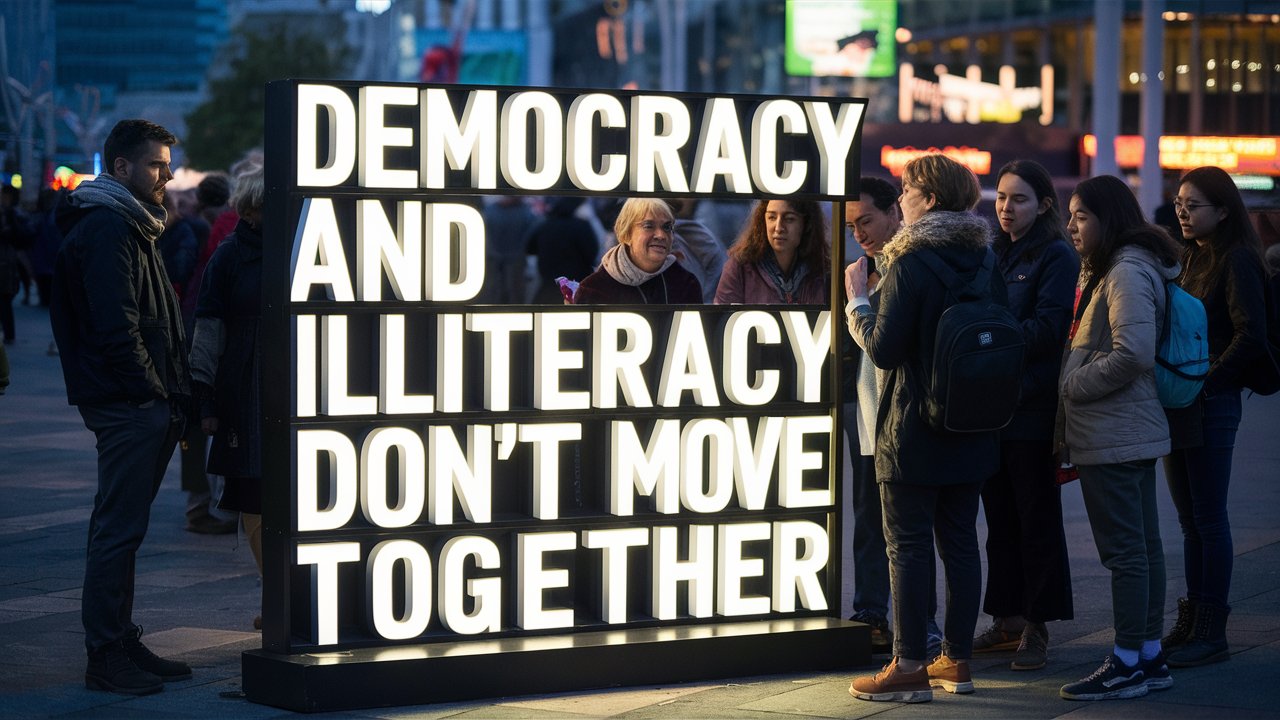7. Democracy and illiteracy don’t move together. 2019

Introduction:
Democracy is a form of government in which power is vested in the people, who exercise it directly or through their elected representatives. It is based on the principles of freedom, equality, and the rule of law. However, for democracy to function effectively, it requires an informed and educated citizenry. Illiteracy, on the other hand, is a major obstacle to the functioning of democracy, as it limits the ability of citizens to participate in the democratic process. This essay aims to explore the relationship between democracy and illiteracy and argue that they do not move together.
Democracy and Illiteracy:

Democracy is based on the idea that citizens have the right to participate in the decision-making process of their country. This requires citizens to be informed, educated, and able to make rational decisions based on their understanding of the issues at hand. Illiteracy, however, limits the ability of citizens to participate in this process. Illiterate citizens are unable to read, write, or comprehend information, making it difficult for them to understand the issues and make informed decisions.
Illiteracy also limits the ability of citizens to access information, as they are unable to read newspapers, books, or other sources of information. This limits their understanding of the issues and makes it difficult for them to form opinions or participate in debates. In addition, illiteracy limits the ability of citizens to express their opinions, as they may be unable to write or speak effectively.
Illiteracy can also lead to a lack of awareness about the rights and responsibilities of citizens. This can result in citizens being exploited or marginalized by those in power, as they may be unaware of their rights or how to exercise them. This can lead to a lack of accountability and transparency in government, as citizens are unable to hold their leaders accountable for their actions.
Furthermore, illiteracy can lead to the proliferation of misinformation and propaganda. Illiterate citizens are more vulnerable to manipulation and are more likely to believe false information or propaganda. This can lead to the spread of harmful beliefs or ideas that undermine democracy and the rule of law.
In short, illiteracy is a major obstacle to the functioning of democracy. It limits the ability of citizens to participate in the democratic process, access information, and hold their leaders accountable. It also contributes to a lack of awareness about citizens’ rights and responsibilities and can lead to the spread of misinformation and propaganda.
The Importance of Education in Democracy:
Education is a key factor in the functioning of democracy. It allows citizens to access information, understand the issues, and make informed decisions. It also promotes critical thinking and the ability to evaluate information and arguments. Education also teaches citizens about their rights and responsibilities, which is essential for holding leaders accountable and participating in the democratic process.
Education also promotes civic engagement and the development of active citizenship. It encourages citizens to participate in public life, engage in debates, and contribute to the development of policies and decisions that affect their lives. It also promotes social cohesion and the development of a shared sense of identity and purpose, which is essential for the functioning of democracy.
Furthermore, education promotes economic development and the reduction of poverty, which is essential for the functioning of democracy. Poverty is a major obstacle to the participation of citizens in the democratic process, as it limits their ability to access information, participate in debates, or hold leaders accountable. Education promotes economic development by providing citizens with the skills and knowledge necessary for employment and economic growth.
Conclusion:
In conclusion, illiteracy and democracy do not move together. Democracy requires an informed and educated citizenry that is able to participate in the decision-making process, access information, and hold leaders accountable. Illiteracy, on the other hand, limits the ability of citizens to participate in the democratic process, access information, and hold leaders accountable.
Visit: https://techinsightguru.com/